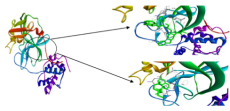Simulations of Mutated Indinavir and Hydroxychloroquine-SARS-CoV-2 Protease Complexes
Award from the COVID-19 HPC Consortium
Investigators: Jithin Sunny
Affiliation: Shri Ramaswami Memorial University of Science and Technology
Much effort has been made to understand the drug-protein interactions for developing anti-viral therapies. To target viral infections, analyzing potential inhibitors targeting their proteins has been a widely used approach. The current SARS-CoV-2 protease is a promising target and has been used with a combination of many anti-protease drugs to inhibit its function. Our initial analysis has shown Indinavir and Hydroxychloroquine to bind with protease with a higher affinity than the currently studied drugs. However, rapid evolution in viral genomes may sometimes lead to the acquisition of mutation in proteins, leading to variation in drug binding. Thus, besides the initial docking studies, we also evaluated the binding affinity of the two drugs with several mutant protease structures. Preliminary results have shown Hydroxychloroquine to be effective against mutating SARS-CoV-2 protease. With an aim to further validate these results, we wish to perform molecular dynamics simulations. MD simulations are necessary to demonstrate the binding stability of the drug-protein complex. The stability of the mutant Hydroxychloroquine-protease complexes over the time period of 50-100 nanoseconds will determine whether the drug is indeed responsive towards a mutating SARS-CoV-2 protease. Using the computational resources provided by the consortium, the GROMACS tool can be used to study the changes in significantly less time.
About NERSC and Berkeley Lab
The National Energy Research Scientific Computing Center (NERSC) is a U.S. Department of Energy Office of Science User Facility that serves as the primary high performance computing center for scientific research sponsored by the Office of Science. Located at Lawrence Berkeley National Laboratory, NERSC serves almost 10,000 scientists at national laboratories and universities researching a wide range of problems in climate, fusion energy, materials science, physics, chemistry, computational biology, and other disciplines. Berkeley Lab is a DOE national laboratory located in Berkeley, California. It conducts unclassified scientific research and is managed by the University of California for the U.S. Department of Energy. »Learn more about computing sciences at Berkeley Lab.








